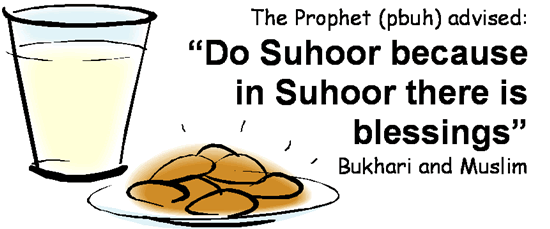Posted by Umm Sahl in Featured, Ramadan | 4 Comments
The Importance of Suhur
 A suhoor(pre-dawn meal) is more important than Iftaar (breaking of the fast)because it helps the fasting person persevere through the fast.
A suhoor(pre-dawn meal) is more important than Iftaar (breaking of the fast)because it helps the fasting person persevere through the fast.
Suhoor is so called because it happens at the time of sahr, which is the end of the night.
‘Amr Ibn al-Aas reported that the Messenger of Allah (SAW) said: “The distinguishing feature between our fast and the fast of the People of the Book is in the eating at the time just before dawn.” [Muslim]
‘Abdullah Ibn Haarith said that one of the Sahabah (companion) said: ‘I entered the house of the Messenger (SAW) whilst he was taking the Suhoor (pre-dawn meal), and he (SAW) said: “Indeed it (the Suhoor) is blessing that Allah has given to you so do not leave it out.” [An-Nasaaee and Ahmad]
Abu Sa’eed al-Khudree said that the Messenger (SAW) said: “Eating the Suhoor is blessed. Do not neglect it even if you take a gulp of water, because Allah and His angels invoke blessings upon those who partake in the pre-dawn meal.” [Ahmad].
It was narrated that Anas ibn Maalik (may Allaah be pleased with him) said: The Prophet (peace and blessings of Allaah be upon him) said: “Eat suhoor, for in suhoor there is blessing.” Narrated by al-Bukhaari, 1923; Muslim, 1095.
It was narrated from Jaabir that the Prophet (peace and blessings of Allaah be upon him) said: “Whoever wants to fast, let him eat something for suhoor.” Narrated by Ahmad, 14533; classed as saheeh by al-Albaani in al-Silsilah al-Saheehah, 2309.
What to eat during suhoor
It was narrated that Abu Hurayrah (may Allaah be pleased with him) said: The Messenger of Allaah (peace and blessings of Allaah be upon him) said: “The best suhoor for the believer is dates.” Narrated by Abu Dawood, 2345); classed as saheeh by al-Albaani in Saheeh Abi Dawood.
It was narrated that Abu Sa’eed al-Khudri said: The Messenger of Allaah (peace and blessings of Allaah be upon him) said: “Suhoor is a blessed meal, so do not omit it, even if one of you only takes a sip of water, for Allaah and His angels send blessings on those who eat suhoor.” Narrated by Ahmad, 11003; classed as hasan by al-Albaani in Saheeh al-Jaami’, 3683.
The best time for suhoor
It was narrated that Zayd ibn Thaabit (may Allaah be pleased with him) said: “We ate suhoor with the Prophet (peace and blessings of Allaah be upon him) then he went to pray.” I [the narrator] asked, “How long was there between the adhaan and suhoor?” He said, “As long as it takes to recite fifty verses.” Narrated by al-Bukhaari, 1921; Muslim, 1097.

 Umm Sahl, your sister in Islam, a wife and mother of 3 beautiful blessed babies
Umm Sahl, your sister in Islam, a wife and mother of 3 beautiful blessed babies
Narrated Abu Huraira:
The Prophet said, "Whoever established prayers on the night of Qadr out of sincere faith and hoping for a reward from Allah, then all his previous sins will be forgiven; and whoever fasts in the month of Ramadan out of sincere faith, and hoping for a reward from Allah, then all his previous sins will be forgiven."
Allah’s Apostle was the most generous of all the people, and he used to reach the peak in generosity in the month of Ramadan when Gabriel met him. Gabriel used to meet him every night of Ramadan to teach him the Qur’an. Allah’s Apostle was the most generous person, even more generous than the strong uncontrollable wind (in readiness and haste to do charitable deeds).
Some people asked Allah’s Apostle, "Whose Islam is the best? i.e. (Who is a very good Muslim)?" He replied, "One who avoids harming the Muslims with his tongue and hands."
The article above is encouraging… especially for people, like myself, that dread waking up in the early hours of the morning.